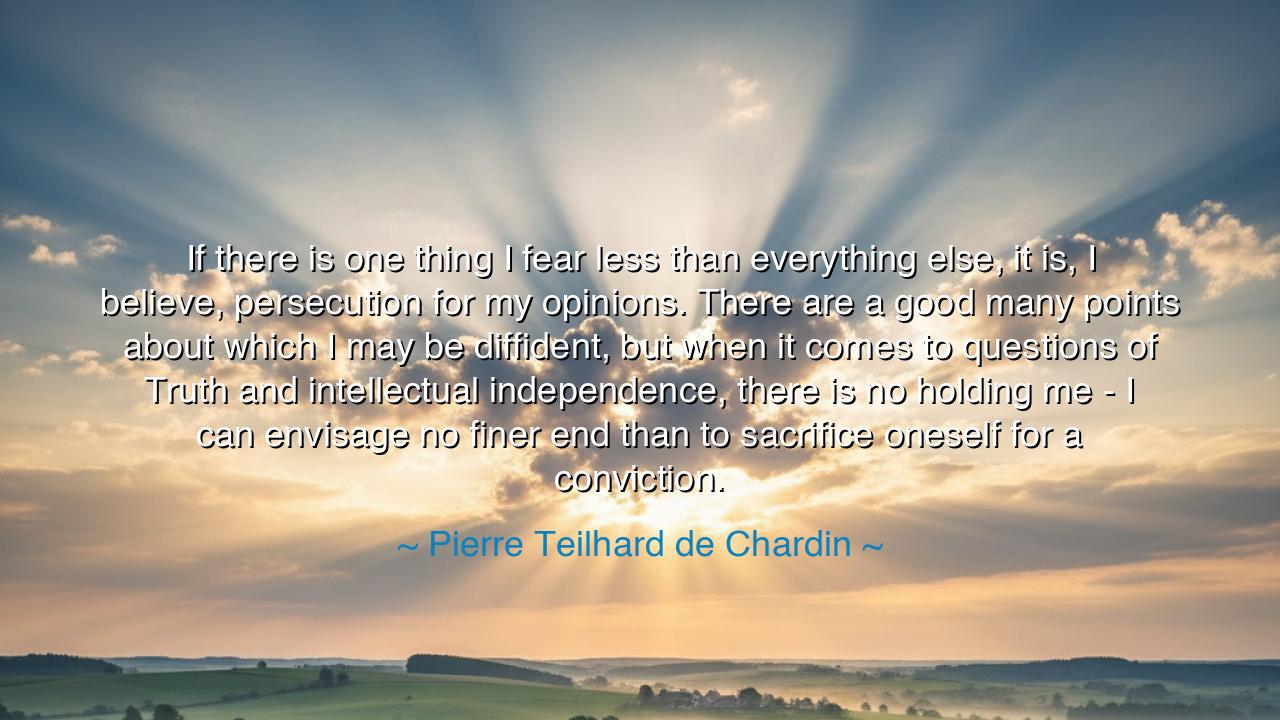
If there is one thing I fear less than everything else, it is, I
If there is one thing I fear less than everything else, it is, I believe, persecution for my opinions. There are a good many points about which I may be diffident, but when it comes to questions of Truth and intellectual independence, there is no holding me - I can envisage no finer end than to sacrifice oneself for a conviction.






Hear now, O children of wisdom, the words of Pierre Teilhard de Chardin, who speaks with the voice of one who has glimpsed the truth of the world: "If there is one thing I fear less than everything else, it is, I believe, persecution for my opinions. There are a good many points about which I may be diffident, but when it comes to questions of Truth and intellectual independence, there is no holding me - I can envisage no finer end than to sacrifice oneself for a conviction." These words, though spoken by one man, carry the essence of the struggle for freedom of thought, for the pursuit of truth, and for the courage to stand firm in one’s beliefs, even when it means standing alone.
Consider, O children, the meaning of truth and intellectual independence. These are not mere abstractions; they are the lifeblood of the human spirit. Truth, in its purest form, is the spark that drives every great discovery, every act of courage, and every advancement of knowledge. It is a force more powerful than the strongest armies, for it transcends time, space, and the fleeting whims of any era. Intellectual independence is the freedom to seek that truth without fear of censure, without the chains of dogma or conformity. To be intellectually independent is to walk a path unshackled by the expectations of others, a path that may sometimes be lonely, but is always true.
Remember, O children, the story of Galileo Galilei, a man who dared to challenge the established truths of his time. The earth was believed to be the center of the universe, and to suggest otherwise was heresy. Yet Galileo, with his powerful intellect and unshakable belief in the principles of science and observation, chose to stand firm in his convictions. He was persecuted, imprisoned, and silenced by the very powers that sought to uphold a false truth, yet he did not falter. He sacrificed his own comfort, and even his freedom, for the sake of intellectual independence, believing that the pursuit of truth was more important than the fear of persecution. His work laid the foundation for the scientific revolution that followed, changing the world forever.
In a similar vein, we find the example of Socrates, the great philosopher of ancient Greece. Socrates, who spoke of the necessity of questioning everything, was condemned to die for his beliefs. He was given the choice to recant his views and save his life, but he chose death rather than give up his commitment to truth and philosophy. To Socrates, the pursuit of truth was the highest calling, and he would rather face persecution than compromise his intellectual integrity. His death was a martyrdom for the very ideals that would go on to shape the foundation of Western philosophy.
Pierre Teilhard de Chardin echoes this same courage when he speaks of sacrificing oneself for a conviction. What is a conviction, O children, if not a belief so deeply held that it shapes our very actions, guiding us through the darkest moments of life? To stand firm in one’s beliefs, even when the world turns against us, is a noble and powerful act. Teilhard de Chardin teaches us that the pursuit of truth is worth more than personal safety, more than the approval of others, for truth is the light that leads us from the shadows into a brighter world. Those who have the courage to walk that path, to sacrifice for their convictions, leave a legacy that transcends their own lives.
The lesson, O children, is clear: in this world, there will be times when we are faced with the choice to either follow the truth or submit to the pressures of conformity. Society, institutions, and even the closest of friends may seek to silence us, to crush our intellectual independence, to make us afraid of standing alone. But as Teilhard de Chardin reminds us, it is in the act of sacrificing for conviction that we find our true strength. The pursuit of truth, the courage to be intellectually independent, is the greatest gift we can give to ourselves and to the world.
So, O children, let us not fear the persecution that may come when we speak our truth. Let us remember that the great minds of history, from Galileo to Socrates, were not deterred by the forces that sought to silence them, but instead, they used their voices to change the world. Truth is not something to be hidden or stifled; it is something to be proclaimed, even in the face of adversity. And in this, we will find not only the fulfillment of our own souls but the inspiration to guide future generations toward a world where independent thought, courage, and the pursuit of truth are the highest values we uphold.






AAdministratorAdministrator
Welcome, honored guests. Please leave a comment, we will respond soon